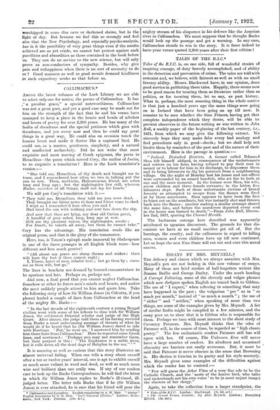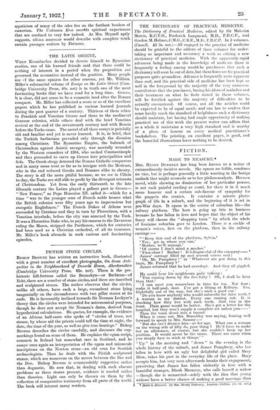ESSAYS BY MRS. MEYNELL.f Tan .delicacy and charm which we
always associate with Mrs. Meynell's pen are not lacking in this new volume of essays.
Many of these are brief studies of half-forgotten writers like Joanna Baillie and George Darley. Under the acerb heading
A Corrupt Following, some of the slovenly and vulgar phrases which now disfigure spoken English are traced back to Gibbon.
The use of " I expect," when referring to something that may have _happened in the past ; the vulgarism " per " as in " so much per month," •instead of " so much a month " ; the use of " either " and " neither," when speaking of more than two things, are some of the examples given by Mrs. Meynell. A list
of similar faults might be compiled in a few _minutes, and the essay goes on to show that it is Gibbon who is responsible for them. Perhaps we turn with most interest to the short study of Coventry Patmore. Mrs. Meynell thinks that the odes of Patmore will, in the course of time, be regarded as " high classic poetry." The few enthusiastic readers Patmore still has will agree with her. Of course, The Unknown Eros will never have a large number of readers. lts aloofness and occasional
obscurity are barriers not -easily overcome. But, it must be said that Patmore is never obscure in the sense that Browning is. His diction is Grecian in its purity and his style -masterly.
Mrs. Meynell gives some examples of the difficulties against which the reader has to contend :-
" Few will guess the Arbor Vitae of a very fine ode to be the Catholic Church, and the ' nests of the.hoarse bird, who talks and understands not his own voice ' to be (a most unjust image) the clusters of her clergy."
Again, to take •the collection from a larger standpoint, the
• Tales of the R.T.C. London : Blackwood. [7s. 6d. net.] t The Second Person Similar. By Alice Meynell. London : Humphrey Wilford. [6s. net.]
mysticism of many of the odes lies on the furthest borders of esoterism. The Unknown Eros recofds spiritual experiences that are confined to very few 'indeed. As Mrs. Moynell aptly suggests, ultimo amarezza would describe with complete truth certain passages written by Patmore.











































 Previous page
Previous page